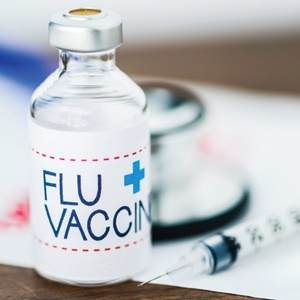
As winter approaches, the diseases associated with this season become top of mind once more – and the chief protagonist is influenza. As the old saying goes: "Prevention is better than cure" and that couldn’t be more true than in the case of influenza, or 'flu, as it is more commonly referred to.
Flu is a highly contagious viral disease, which spreads at a rapid rate, and can have devastating consequences if left untreated, even resulting in death. It is not a disease to be treated lightly and it should not be confused with the common cold. Its effect on a company’s workforce and profitability can be dire.
The contagious period is one to two days before any flu symptoms appear and five days thereafter, and it is transmitted in a variety of ways – airborne, droplets or by direct contract.
However, an annual flu vaccination programme within the workplace is an effective way to stop flu transmission among employees, their families and customers; lower absenteeism and maintain productivity; and reduce medical costs.
The workplace a breeding ground
The workplace is an ideal breeding ground for the flu virus – especially in an open-plan office environment where people work in close proximity to each other for long periods of time.
Cramped areas within the building, such as lifts, meeting rooms or coffee stations where the air is stuffy due to closed windows and a lack of fresh air, also become problem areas.
The impact of flu is underestimated in South Africa, but annual epidemics are costly events and can be deadly. The World Health Organisation estimates that between three to five million cases of severe flu illness result in 250 000 to 500 000 deaths annually in the industrialised world alone.
The annual cost of flu is highly variable but statistics show that it has a significant economic impact on the working age population. Annually up to 26% of all 18 – 64 year olds could possibly catch flu, resulting in a significant increase in sick leave days taken by otherwise healthy working adults during the flu season.
The general recovery period for a patient suffering from flu comprises three to four days of bed rest, and two or more weeks for full recovery. This becomes very costly for each individual company, and therefore for the national economy as a whole.
Flu main cause of absenteeism
Flu is responsible for 10 – 12% of all absenteeism from the workplace worldwide, and absenteeism and lost productivity account for approximately 70 – 80% of the total annual cost of flu in the USA.
Across Europe, work absenteeism from flu illnesses results in indirect costs that could be as high as 20 million Euros in lost days of work in a single flu season.
The figure quoted for South Africa for the percentage of workers who have to take sick leave because they have the flu – and have not been vaccinated against the virus – is 66%, and they are off work for an average of 2,5 days.
Young children more susceptible
The cost of the disease does not exclude children. In fact, young children up to the age of 12 are highly susceptible to the flu virus because they secrete the virus more easily and harbour it for much longer than adults.
School absenteeism does not only impact on children but contributes on average to a loss of three working days for the parent who must remain at home with the child. There is also the very real possibility that the parent will then get infected too, leading to further absenteeism from the workplace. Then there is the added cost of the medical expenses to treat the virus.
Unproductive presenteeism within the workforce (i.e. when a worker reports to his or her place of work, but is unproductive due to flu symptoms) is equally costly to a company because the worker is unproductive and is spreading the virus because he or she is contagious.
In-house flu vaccination profitable
All of these facts add up financially, but they need not. An in-house flu vaccination programme administered to a company’s workforce at the start of the flu season (between March and May in South Africa) has been proven to be profitable and protects the business environment.
The flu vaccination programme also has a proven track record of success to provide protection against the virus. In fact, vaccinating the employees can reduce absenteeism from the workplace by as much as 78% and its efficacy is 88 – 89%.
The cost of a single vaccine dose is around R45,00. However, the vaccination programme does yield net savings and a cost-benefit ratio for the company which shows a positive return on investment – i.e. for every R1,00 invested, a savings of R3,75 is yielded.
So, by investing R45,00 per employee for a single flu vaccine dose, a saving of R168,75 per employee is achieved. This makes economic sense.
The company benefits
In addition to the positive return on investment, the company benefits in other ways. It is seen as a caring employer since its vaccinated employees avoid infecting other family members (in particular the elderly and children, who fall into the high-risk category), and a suitably high vaccination rate in the company breaks the chain of infection, allowing the entire workforce to benefit from the "herd immunity".
Ideally, everyone should be vaccinated against the flu virus because the more people who are vaccinated, the less chance of the virus spreading. The flu vaccine is well-tolerated, easy to administer and is highly effective in protecting the community against the flu virus.
The benefits of the flu vaccination cannot be over-emphasised. So, ensure that you and your employees are vaccinated against the flu, before the flu bug gets to you.
(Press release, The Flu Vaccine Consortium, April 2007)




 Publications
Publications
 Partners
Partners















